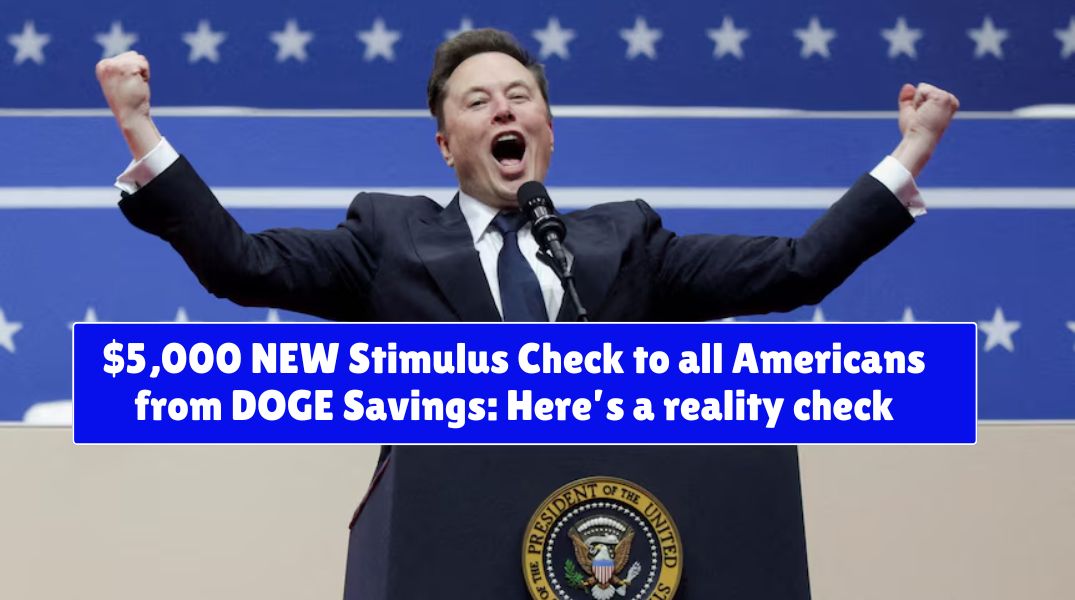A recent proposal by James Fishback, a strong DOGE supporter, has sparked online debate. He suggested distributing “DOGE Dividends”—a $5,000 payout—to tax-paying American households. This idea gained even more attention when Elon Musk responded, stating he would “check with the president.” The proposal claims that DOGE, a government cost-cutting initiative, has saved billions, making the payments possible. But is this claim real, or is it just political hype? Let’s break it down.
What Are ‘DOGE Dividends’?
James Fishback, the CEO of Azoria and an alleged DOGE advisor, posted on X (formerly Twitter) about the idea of giving Americans a tax refund check of $5,000. He based this on the estimated savings that DOGE would generate for the U.S. government by 2026.
According to Fishback, 20% of DOGE’s expected $2 trillion in savings could be distributed among approximately 79 million tax-paying households. This would result in a one-time payment of $5,000 per household.
Musk’s response—”Will check with the President”—added fuel to speculation. But while the idea sounds appealing, there are serious doubts about its feasibility.
DOGE Claims to Have Saved $55 Billion—What’s the Reality?
The official DOGE website claims that the program has saved the U.S. government around $55 billion. These savings reportedly come from:
- Fraud detection and removal
- Cancelling or renegotiating contracts and leases
- Selling government assets
- Cutting grant allocations
- Workforce reductions
- Program and regulation changes
While these numbers sound impressive, they are not independently verified. DOGE has promised to make all data transparent, but until then, skepticism remains.
Are DOGE’s Savings Numbers Accurate?
Investigative reports from major news outlets have raised questions about DOGE’s savings claims.
1. Discrepancies in the Data
The Washington Post calculated the total savings reported by DOGE and found only about $6 billion annually—far less than the claimed $55 billion. Additionally, much of these cuts reportedly come from diversity, equality, and climate change programs.
2. Contract Cancellation Misrepresentation
The New York Times found that DOGE exaggerated some of its savings. For example:
- DOGE claimed it saved $16 billion by canceling contracts.
- One specific case involved an $8 billion contract with Immigration and Customs Enforcement (ICE).
- However, the actual contract value was only $8 million, and only $2.5 million had been used so far.
These inconsistencies raise doubts about DOGE’s financial claims and whether it has truly saved the government as much money as it suggests.
$5,000 DOGE Dividend: Possible or Political Gimmick?
President Trump and @ElonMusk should announce a ‘DOGE Dividend’—a tax refund check sent to every taxpayer, funded exclusively with a portion of the total savings delivered by DOGE. 🧵 pic.twitter.com/p5AZZj3Ttc
— James Fishback (@j_fishback) February 18, 2025
Experts caution that distributing money to taxpayers is not simple. Even if DOGE’s claimed savings are real, redirecting the funds to individuals would require:
- Approval from Congress – Lawmakers might prefer to use the money elsewhere, such as reducing the national debt.
- Review by Federal Offices – The Office of Management and Budget (OMB) and the Congressional Budget Office (CBO) would need to verify and track these savings before any distribution.
- Legal Clearance – There are ongoing legal questions about DOGE’s operations. If courts rule against it, the entire program could be shut down.
Can It Happen?
History shows that direct payments to taxpayers are not unheard of. During the COVID-19 pandemic, both Donald Trump and Joe Biden approved government stimulus checks. However, those payments came from approved government budgets, not claimed savings from a cost-cutting initiative.
In contrast, DOGE’s supposed savings are not yet fully realized or legally allocated for public distribution. Without official approval, the proposal remains more of an idea than a reality.
The idea of a $5,000 check for Americans is certainly attractive, but the reality is much more complicated. While DOGE claims to have saved billions, independent reports suggest the numbers may be inflated or misleading. Any decision to distribute these funds would require congressional approval, legal validation, and proper financial tracking—none of which have been confirmed.
For now, the DOGE Dividend remains more of a political talking point than a realistic financial plan. Until more transparency and legal backing emerge, Americans should view this proposal with skepticism.














